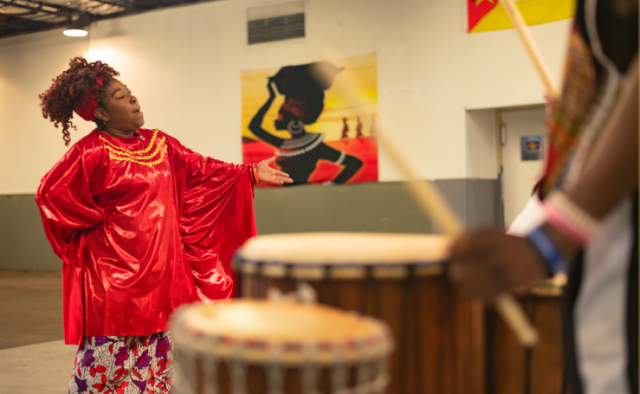
By Je’Don Holloway Talley
For the Birmingham Times
Maria Sullivan tried ballet, jazz, and tap dancing, but those never worked out.
“When I was introduced to West African dance, I could do it all,” she recalled. “Once I got on the floor, it became healing because I was overweight as a little girl. [It helped me] realize that I could do everything that was brought before me.”
Sullivan, 33, lead dancer and choreographer for the Sahi On Ko Djony West African Cultural Enrichment Program, got her start in West African dance at the age of 13. The drums, the rhythms, and the history speak to the soul of black people, she said.
“The rhythm calls to you, and then the culture that you learn behind it calls to you because you learn why these groups of people did these dances, how important it was for them to do them, and how they believed in it.”
Sullivan, who has been part of Sahi On Ko Djony since its beginnings in 1999, teaches West African dance and West African dance history.
“Sahi On Ko Djony” is a Fulani term originating from the West African country of Guinea that means “The time is now.”
“There are songs that go along with [the dances], and I teach the songs as well as their meaning,” said the A.H. Parker High School grad. “My favorite dance, its root name is ‘Lamban,’ [which] gives praise to the ‘Djelis,’ [scribes and storytellers] of West Africa. This dance was to praise them because the ones who tell the story and write history, … so they were treated like kings and queens. This dance was to thank them for their stories and for being keepers of the stories.”
The Lamban is more of an angelic dance: “It’s really soft when it first starts off and then it escalates into a celebration.”
Sullivan, a West End native and resident who is a single mom to a 6-year-old daughter, loves teaching the history that goes along with the dances.
“I love sharing and being able to educate [black people] about us. I love being able to share this history with another child or adult,” said the instructor, who is also an Artist in Residence at the Black Star Academy Home School Collective.
“The culture can be healing,” she said. “That’s the one thing about West African dance and our history, in general: … It tends to be more so passed down through verbiage; nobody writes it down. I began to study and learn more history about the dances, where they came from, and the groups of people that performed these dances.”
Sullivan learned West African dance under instructor Lavandia Square Bryant, who is founder of Nathifa’s Dance Company based in Irondale.
“It was in 2000, and I was a part of a program called ‘Kids Café,’ a camp for underprivileged kids that was located here in West End. [The camp] wanted to do a big production at the end, so they brought in [Bryant], who taught ‘Funga,’ [West African song and dance]. When she wasn’t there, somebody needed to rehearse with the kids, and that somebody was me,” said Sullivan, who would go on to join Nathifa’s.
“[Bryant] saw my interest and my love for [West African dance], and she pulled me [into her company]. I started taking lessons with her and became part of her company. That was actually how I met [Sahi On Ko Djony founder Edmond ‘Barry’ Johnson], who was performing with Bryant at the time.”
Sullivan, who earned a bachelor’s degree in nursing from Jacksonville State University, also traveled to Atlanta, Ga., to take classes with the Uhuru Dance Company, where she developed and learned more complex moves and combinations, in addition to more songs and more history.
Asked what she believes is most enriching about Sahi On Ko Djony, Sullivan said, “the relationships you build with people.”
“Regardless of what people may believe or practice, know or not know, some kind of way these drums, the dances brings people together. You can feel bad and down, and when those drums get to playing it can [create] a whole different world. … We’ve been in the park, and people have heard us and gravitated toward us. No matter your walk of life, it can bring us together.”
Click here to read about Sahi On Ko Djony’s lead drum instructer, Ronique Carter.




